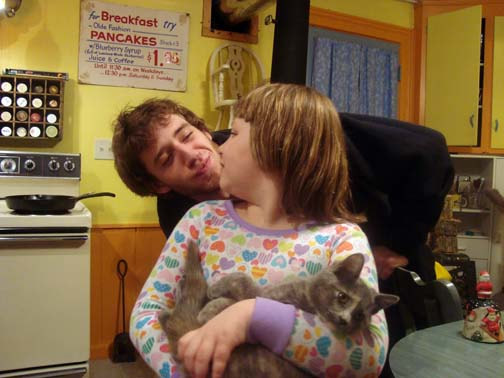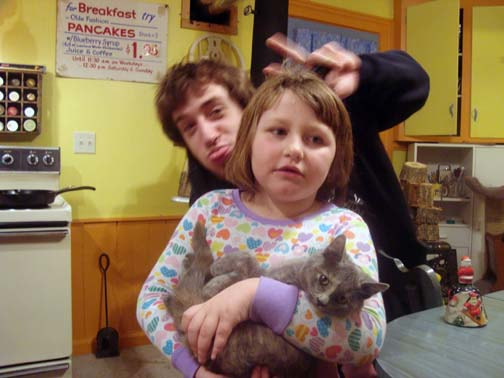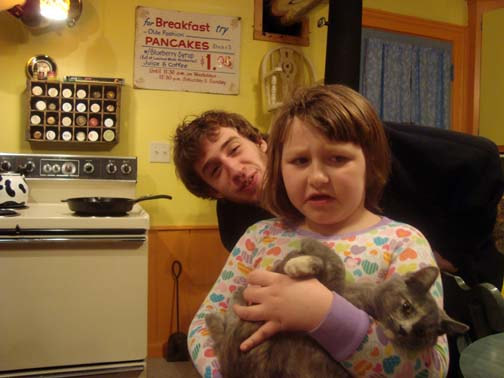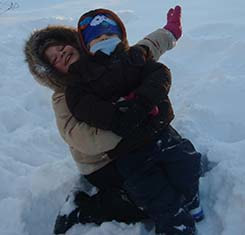|
I'm the eldest of three siblings. My brother and I are only 3 1/2 years apart, while my sister is 16 years younger than me. Unfortunately, because of our age difference, my sister and I never grew up together and didn't have much of a relationship until she became an adult. Even now, we don't share the same early experiences and had very different relationships with our parents, so our current relationship feels less like a sibling one and more of a friendship. My brother and I shared all of our early years, the joys and struggles and can reminisce together. It's a very different thing.
Although my brother and I formed an early bond, we often didn't get along. I spent my childhood feeling unloved by my mother and given preferential treatment from my dad. My brother had the opposite, being doted on by Mom and denigrated and belittled by Dad. As a result, we fought hard and often. My own children came following that same time frame with two children 3 1/2 years apart and a third much later. And, they followed the same behavior patterns. Thankfully, my two oldest get along very well now, unlike my brother and I who don't fight anymore but don't have much to do with each other either. I've realized, in watching my own children, grandchildren and siblings in my music classes, that I must have resented my brother invading my home. I imagine that when he was an infant, I adored him and envisioned myself a surrogate mom to him. I saw that with my daughter when her brother came along and again in my granddaughter when her brother was born. As these infants get older, they start resenting being smothered by their older siblings. When they can move around, they don't want to be manipulated by anyone. They want to explore their newfound freedom. They also start getting into anything that's available, including their older sibling's toys who resent that as well as being usurped as the golden child. It's a vicious circle. As parents, it's our job to protect our babies and teach the toddlers or young children respect and appropriate behavior. Of course we want them to be close and enjoy each other, but it's a delicate balance that's often hard to navigate. I've sometimes had to make rules in my music classes that the babies were to be left alone during class. I saw too many babies fussing about being poked and prodded instead of being able to enjoy the music in their own way with everyone else. The older child was so busy trying to boss the little one, they weren't engaged in the class either. Then, the parents were trying to navigate the whole situation and everyone ended up missing the joy of singing. At the risk of generalizing, I think the problem is more common with older sisters. They seem to have a maternal instinct at an early age due to their genetic make-up and also to the roles thrust upon us by society. Since the wave of radical feminism has passed, we've come around again to an age of lots of princesses, tea parties and pink tutus for girls. They see these new babies as little dollies for their pleasure. It's a short hop from that to trying to parent them, and we inadvertently reinforce that by reminding them that they are the role models. In watching all of this, I've also realized that my mother was probably just trying to protect my brother from an overzealous but loving sister. To this day, my daughter accuses me of having favored her brother over her. She has only one child. I suspect that if she'd had a second, she might understand a little better the need for parents to rein in the first child. When he was one day old, she raced to his cradle when he was crying, snatched him up and dropped him. When he got a little older, she dressed him up like a dolly, whether he wanted it or not. She bossed and pushed him around, even manipulating his little body to her own ends, and always knew better than I did what he needed or wanted. Of course, she did these things. I did them, too. As a parent though, I needed to be his protector. The mistake I made, and my mother before me, was in carrying on this protection too long. My son came to depend on it and used it to his advantage, as did my brother. It's very hard to know when the time has come to leave them to their own devices. It's hard in general to know when to cut the apron strings, but harder still when you've been thrust into the role of protector. And, make no mistake, younger siblings really do need that protection. So, how do we avoid these resentments? I think it all comes down to a familiar theme - limit setting. If we set limits early on, things shouldn't get so out of control. Yes, older siblings need to be involved and hold their younger brother or sister. But they don't need to hold them every time they ask. And, we need to be sensitive to the babies. Do they seem uncomfortable? If so, scoop them up with no apology and try again later. I've had a chance to work on this with my grandchildren and other children who visit. I often choreographed games they could play together. Sometimes, they'd have a "re-do". i.e. "____ didn't like that. How can you do that differently so that you are both happy?" or "What do you think you can do that you'll both enjoy?" Sometimes, it would just be, "______ didn't like that. Stop it!" You will all figure this out as you go. But, if you don't start early, the resentments just grow. And it's a difficult and confusing road. In spite of our differences however, my brother and I always had each other's backs. Growing up in our household was not easy. There was a lot of abuse which, I'm sure, contributed to our fighting. However, we also looked out for each other and still love each other very much. And, when our parents died, it was important for us to have each other. A sibling relationship is one of the most important ones we have. They help form who we become as adults. Siblings often have more influence than parents or teachers. We are all lucky to have them. There have been multiple studies done on sibling relationships and their importance. http://www.independent.co.uk/life-style/siblings-kind-empathetic-characteristics-children-impact-canada-study-families-a8219216.html http://www.health.com/mind-body/6-ways-your-siblings-make-you-who-you-are
0 Comments
My daughter recommended that I write about "Mommy eyes." This is a term I've used a lot as a parent. When I called my children out on something they'd done that they thought they got away with, I would tell them that "Of course, I saw you do that. I have Mommy eyes." Or when they went looking for something that was usually right in front of them I would tell them to "go back and look again with Mommy eyes." When they used "Mommy eyes" they found it every time. It's amazing to me how quickly we develop those Mommy (or Daddy) eyes. We seem to be able to see through walls, our sense of hearing becomes very acute and we can just sense when something is not right. We grow eyes in the back of our heads. Now, I also used some tricks along the way. I admit to sneaking quietly up to a bedroom door to listen to what was going on in there or pretending to be asleep on the couch while listening intently to the conversations around me. It's also good to have spies. My spies often had no idea they were working for me. I just had casual conversations with them and left room for information to leak. I also have to admit that I sometimes made accusations based on little evidence to try to flush them out. And, sometimes I just guessed. Usually, I was right. When I was wrong, I was always quick to apologize. My kids were sharp, and I needed every tool I could find. Sooner or later, every child is going to try to get away with something. We did it, why shouldn't they? Even the most well-behaved child will eventually tell a lie. If we think they won't, we will not be prepared for it when it happens. I always chuckle when that revelation comes to a parent for the first time. Ironically, those of us who were the best liars are often fooled by the lies of our children. Just yesterday, my son was recollecting when he aggressively went to bat for his daughter with a teacher, insisting that she would never lie to him. But, she did, and he had to deal with his embarrassment, deal with her behavior in school and the lie she told to him. Then he had to deal with the teacher for the rest of the school year. Everyone lies sometime. This bears repeating. Like many parents, I struggled with how to deal with those lies. No one wants to come right out and accuse your child of being a liar. And, when does it stop being imaginative play and start to become lies? It's not imaginative play when someone is trying to avoid being caught at something, or trying to have their own way. If it's being said to manipulate a situation or person, it's probably a lie. Even when you admire their creativity, try to remember that it's not cute. It's setting a dangerous precedent that will harm them in the long run. Once a pattern of lying is established, it's very hard to break. That's why it's so important to learn to see through the lies early on and deal with them sternly. If you were a good liar, you're probably feeling confident that you will be able to tell when your child is lying to you. Take it from one good liar to another, it's not as easy as you would expect. My kids got away with way too much. They must have inherited my lying genes and then took it a step or two further. The more a child gets away with lying, the more they hone that skill. By the time they are teenagers, you may have no idea what's really going on. If your young child is starting to lie to manipulate you or their surroundings, better nip it in the bud before it gets out of hand. Come up with some strategies for encouraging truth-telling and consequences for lying. As always, please send your suggestions to me for topics you would like covered in this blog. This week's topic is about over-scheduling our children. This one has been requested and is important to think about. I didn't have to worry about it as a parent because we were so low-income, we couldn't afford many lessons or extra-curricular activities. However, I have been a teacher for a long time and have seen disturbing changes in schools, families and neighborhoods. My children usually seemed more relaxed than their peers. They usually had one activity at a time that they were engaged in, some kind of sport, music lessons or dance classes. Their friends often didn't have time to play after school because they were rushing off to a class, lesson or sports event. I could see how difficult it was for them to go to school all day and then be involved in some other kind of learning most afternoons. When was their time to just be children?
The government has convinced us that our educational system is behind other countries, and now we're worried that our children are not getting enough enrichment. We've bought into the idea that the schools are not meeting their needs, so we're saddled with Common Core which takes away the teachers' abilities to really teach. It has taken away much of the free time children had to go outdoors or to socialize. Maybe the schools needed improvement, but children need time to grow into themselves, not be molded into what we want them to be or think they should be. Gone are the days when kids went out in their neighborhoods with gangs of other kids and played. There is so much value in learning through play. We learn cooperation and compromise. We learn to use our imaginations and how to problem-solve. They get very little of that in schools these days and not enough during their time at home. When we over-schedule our children, we are teaching them to over-schedule themselves. Today, most families have two working parents out of necessity, but how many of us are overwhelmed with our lives? I know I was for a while until I realized that I could rearrange my priorities and make my life much easier. Now I work part-time hours and make more money than in the past. I have plenty of time to do the things I love, spend time with friends and family and still get my chores done. The amount of stress I created for myself made me tired and unmotivated. I was sabotaging my own life without even realizing it, always on the go and getting nowhere. Not everyone can do what I did, and I'm not suggesting it. I am suggesting that we look at our priorities, look at the amount of free time our children have and how much free time we have together. Every child needs time to explore. Every child needs time to think. Every child needs to learn to be comfortable with quiet and solitude. Many children are bored because they're constantly entertained. When they go to school, the teachers can't keep up that level of entertainment. Children who are swamped with activities when they are young often struggle with boredom as teens. Debilitating boredom is very painful. So, how do we know if we're over-scheduling? I guess we have to evaluate our reasons for these activities. Are we in competition with other parents to have the smartest or best child? Are we living vicariously though our children? Or, do we need them engaged in activities because we can't be around all the time? If we need them in some kind of care-giving situation, why not have them learning something while they're there? It's a delicate balance. Of course we want them to learn to swim, play an instrument, dance, play sports, and the list goes on. But, do they need to do all of those things at once? How much time are you spending in your car driving them from place to place? How much time do you have at home to just be together and enjoy some child-led activities? I'm certainly not an expert on this topic and don't have all the answers. I just know that I've seen a huge shift in the way we raise our kids these days with more and more pressure put on them to perform, and I mourn the loss of childhood. Please share your thoughts on this issue. It is much debated by many experts. Here's a New York Times article I found that you might enjoy reading. http://www.nytimes.com/2013/10/13/fashion/over-scheduled-children-how-big-a-problem.html And another on how to gauge if your child is over-scheduled. https://www.pgeveryday.com/family/parenting/article/11-reasons-overscheduling-your-child-isnt-healthy And here are some great ideas for playing with your child. https://childdevelopmentinfo.com/child-development/play-work-of-children/pl5/ |
Archives
April 2019
Categories |






 RSS Feed
RSS Feed